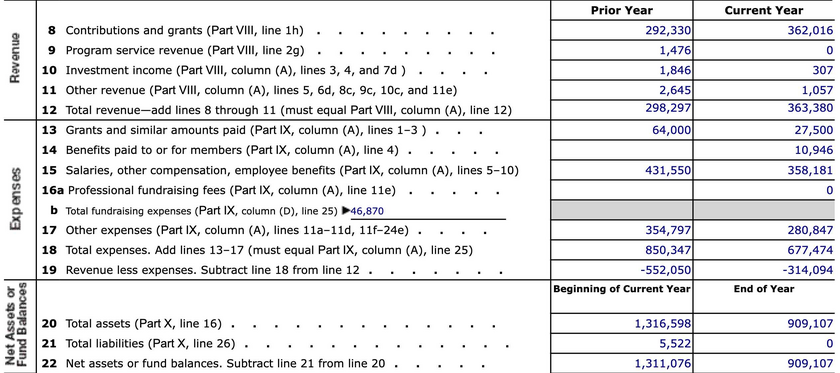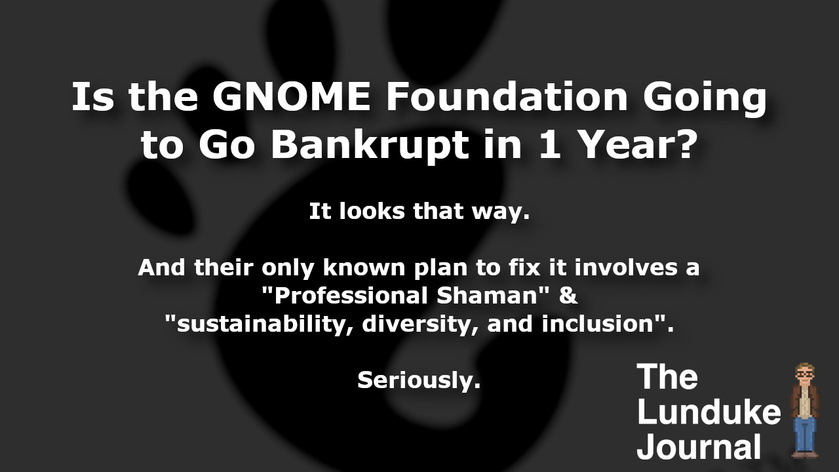It's no secret that many Open Source organizations struggle to fund themselves -- with the GNOME Foundation being on more of a shoestring budget than you would expect for a project as widely used as GNOME.
To make matters worse, the GNOME Foundation has been paying for most of their expenses by draining their savings account (as they spend far more than they take in).
Now, apparently, those savings are running out.
What's more: The GNOME Foundation has been unusually silent about their operations -- not publishing any public reports for closing in on 2 years now. And their strategy to save themselves from bankruptcy appears to center around "sustainability, diversity, and inclusion".
Seriously.
GNOME has "hit the buffers"
From an April 26th announcement from GNOME Foundation President, Robert McQueen:
"As you may be aware, the GNOME Foundation has operated at a deficit (nonprofit speak for a loss – ie spending more than we’ve been raising each year) for over three years, essentially running the Foundation on reserves from some substantial donations received 4-5 years ago. The Foundation has a reserves policy which specifies a minimum amount of money we have to keep in our accounts. This is so that if there is a significant interruption to our usual income, we can preserve our core operations while we work on new funding sources. We’ve now “hit the buffers” of this reserves policy, meaning the Board can’t approve any more deficit budgets – to keep spending at the same level we must increase our income."
In short: GNOME has run out of money. In order to "keep spending at the same level" GNOME needs to find some money.
What sort of money are we talking about?
To fully understand the dire straits the GNOME Foundation finds itself in, let's take a look at what we know about their finances.
Unfortunately, the GNOME Foundation has not published any data in close to two years. They have not published an annual report for 2023, and their most recent IRS records only cover their fiscal year up through September of 2022.
Which means we are forced to look at previous year's data and extrapolate forward based on what information we do have.

In short, total expenses for the GNOME Foundation:
- 2021: $926,821
- 2022: $659,537
And the revenue for those same years...
- 2021: $286,708
- 2022: $363,380
Notice how the expenses far exceed the revenue? Not good. Subtract the expenses from the revenue and you have the net income. And, boy howdy, is it deep into the negative. Which means this is the amount they need to take out of their savings, every year, just to keep the lights on.
- 2021: - $640,113
- 2022: - $296,157
We know that GNOME is burning through between $296K and $640K, of savings, per year. Which begs the question... how much do they have left in terms of cash reserves?
The GNOME Foundation Nest Egg
The most recent information we have, on the GNOME assets, comes from their IRS filings up through September of 2022 (their last publicly available filing).

While those numbers don't exactly line up with the numbers stated in the GNOME Foundation's annual report, that's not entirely surprising. Oftentimes, for these foundations, the annual reports and IRS filings will cover slightly different time periods (and be filed at different times, when different data is available).
Just the same, the numbers are close enough to the annual report that we can work with it.
But the listed assets on this page, as of 2022, really don't give us enough information. This lists $909,107 in total net assets... but what we really need to know is how much "Savings and temporary cash investments" they have.
In other words: How much money can GNOME get their hands on, in short notice, to actively use for funding their immediate expenses? For that, we'll need to look a few pages further down their IRS 990 form... at this line:

Boom. There we go. $765,011.
That's how much the GNOME Foundation had, in September of 2022, in available savings.
How much money does GNOME have left... today?
Now here's where we're going to need to make some assumptions based on the data above.
I hate making assumptions... but, considering the lack of data from the GNOME Foundation, we're left with no other choice.
Let's assume that, in 2023, GNOME managed to keep their annual expenditures down to their 2022 levels (which was far, far lower than the 2021 levels... so this is close to "best case scenario"). And let's also assume that their income stayed steady as well. How much savings would they have left?
Math time. Savings minus the amount they need to withdraw from savings.
- Oct, 2022 through Sep, 2023: $765,011 - $296,157 = $468,854
Now let's make the same assumption from that point (October 2023) through to present (April, 2024). 7 months in total.
We know that the total amount that GNOME would need to draw from their savings -- every month -- is roughly $24,679.75 ($296,157, the yearly savings withdrawal, divided by 12 months). Thus, to get the amount of savings they've spent over the last 7 months... we simply multiply that number by 7. For which we get $172,758.25.
- Oct, 2023 through Apr, 2024: $468,854 - $172,758.25 = $296,095.75
In theory, that's how much money the GNOME Foundation has left in savings. $296,095.75.
Why is that number significant? Because that is almost exactly the amount of savings they will need to withdraw to stay afloat... for one year.
Remember. From the announcement this week: "The Foundation has a reserves policy which specifies a minimum amount of money we have to keep in our accounts."
Could this be related to that number we came up with above? It's possible. It certainly would seem reasonable. But, without better records and communication from the GNOME Foundation, we won't know for sure.
GNOME Foundation has One Year Left?
If their numbers have stayed consistent since September of 2022 -- which is a big if -- this means that The GNOME Foundation has enough funds to continue current operations through April of 2025.
At which point... the GNOME Foundation will need to significantly scale back their expenditures.
They will be forced to lay off the majority of their staff.
All of which raises a number of questions.
What is the new Executive Director doing to save GNOME?
In October of 2023, the GNOME Foundation hired a new Executive Director. A person whose previous job was as a self-described "Professional Shaman" -- not religiously associated with Shamanism, mind you, but a person who sold "flavored Shaman water" and offered paid "Start your own Shaman business" training.
In the half year since that time, the new GNOME Executive Director, Holly Million, has had very little public presence -- no blog posts (after a short introduction), no social media activity, no major interviews, no response to press requests... totally quiet. During the one publicly held event (a "Meet and Greet" last year), journalists were kicked out before it started and the planned recording was canceled for unknown reasons.
What has this GNOME Executive Director been doing to make sure that the GNOME Foundation does not go out of business? It is a mystery. Total silence.
In fact, one of the few indications we have as to the direction that the GNOME Foundation is taking, comes from Twitter posts by other GNOME Board members. Namely, one from the GNOME Vice President, stating:
"excited about the progressive conversation we had with the executive director Holly Million. We engaged in extensive discussions regarding the strategic direction of @gnome, focusing on #sustainability, #diversity, and #inclusion. The future looks green"

From what little information we have, it appears that the GNOME profitability efforts are centered around "sustainability, diversity, and inclusion".
Oh, and "Hashtag: Technology". With a shamrock emoji.
"How does that result in GNOME not going out of business," you ask? I wish I could tell you.
But, according to this week's announcement by the GNOME President, fundraising is one of the key reasons why Holly Million was hired away from her Shaman job.
"One of the board’s top priorities in hiring Holly was therefore her experience in communications and fundraising, and building broader and more diverse support for our mission and work. Her goals since joining – as well as building her familiarity with the community and project – have been to set up better financial controls and reporting, develop a strategic plan, and start fundraising."
Communications. Fundraising. Financial reporting.
That's why their Executive Director was hired -- and those were her goals since she started work over half a year ago.
In that time the GNOME Executive Director has:
- Given no interviews.
- Been totally radio silent (no articles, social posts, podcasts, videos... nothing).
- Not published any financial reports of any kind. We have no clue what GNOME has been doing, financially, for almost 2 years now.
- And, from what little we're being told, she has continued GNOME's deathmarch towards running out of money.
Those goals again: Communications. Fundraising. Financial reporting.
Sounds like a massive, unmitigated failure of all three goals to me. And their plan to turn things around sounds like it centers on "sustainability, diversity, and inclusion"... which is not exactly a strong business plan.
What happens now?
It sounds like things are getting desperate. And the GNOME Foundation will be announcing their plan to save The GNOME Foundation in the weeks ahead.
"The biggest prerequisite for fundraising is a clear strategy – we need to explain what we’re doing and why it’s important, and use that to convince people to support our plans. I’m very pleased to report that Holly has been working hard on this and meeting with many stakeholders across the community, and has prepared a detailed and insightful five year strategic plan. The plan defines the areas where the Foundation will prioritise, develop and fund initiatives to support and grow the GNOME project and community. The board has approved a draft version of this plan, and over the coming weeks Holly and the Foundation team will be sharing this plan and running a consultation process to gather feedback input from GNOME foundation and community members."
What is that plan? How likely is that plan to succeed in bringing in enough funding to keep the foundation float?
At this point, we simply don't know. The GNOME Foundation -- and their Executive Director -- is staying tight lipped and secretive.
All we know is that it includes "sustainability, diversity, and inclusion".
Wait. What about that Million Euro investment?!
Right about now you might be remembering that, last year, the GNOME Foundation announced that they would be receiving 1 Million Euros from the Sovereign Tech Fund.
It sounds like those funds aren't for the foundation, but for specific development purposes:
"This money is received in the form of a contract for services rather than a grant to the Foundation, and must be spent on the development areas agreed during the planning and application process. It’s included within this year’s budget (October 23 – September 24) and is all expected to be spent during this fiscal year, so it doesn’t have an impact on the Foundation’s reserves position."
In other words: That million Euro? It won't be beefing up their savings account.
What about Red Hat, SUSE, & Canonical?
GNOME is heavily relied upon by some of the biggest Linux companies on Earth.
Right about now it's worth considering... why haven't Red Hat (or SUSE & Canonical, for that matter) stepped up to provide the needed funding for the foundation which supports their default Desktop Environment?
Maybe they can't. Maybe they don't want to. The reason for the lack of funding is entirely unknown. But it's worth asking, just the same.
For that matter, where is The Linux Foundation? This seems like exactly the sort of thing a "Linux" foundation -- with over a quarter of a Billion dollars in annual revenue -- could do to help "Linux".
This isn't the first time... but...
Is the GNOME Foundation poised to run out of money? It certainly appears so. And, clearly, the foundation leadership is concerned.
But this isn't the first time they've had money trouble.
Back in 2014 (10 years ago), there were serious concerns about the financials of the GNOME Foundation. So much so that a spending freeze was put into place.
GNOME survived that 2014 financial dip, just as it could certainly survive this new one. Yet the actions of the GNOME Foundation raises serious concerns and doubts.
- Why is GNOME staying so secretive? No published plans, no communication at all from their Executive Director, no published recent reports.
- The only known details of their secret plan to avert a shut down are... "sustainability, diversity, and inclusion". That can't be real... can it? No serious software foundation would stare at possible bankruptcy... and make that a significant part of their strategy.
- What has the Executive Director been doing for half a year? Why hasn't there been any noteworthy fundraising or sponsorships? Considering GNOME's unique place in the Linux and Open Source world, funding GNOME should not be an issue for anyone even slightly familiar with fundraising and the Linux corporate world.
- Why have the large Linux & Open Source companies -- and The Linux Foundation -- not gotten involved? What's going on there?
In the coming weeks, the GNOME Foundation has said that they will announce details of their secretive plan to keep their foundation alive.
For what it's worth, The Lunduke Journal is rooting for them -- and their secret plan. Whatever it may be. I truly hope it succeeds.
But, considering the bad financials and all of the other reasons outlined here, I remain less than optimistic.
Update: April 30th, 2024
While the GNOME Foundation has continued to refuse to speak with journalists, this article has created a bit of a firestorm within the GNOME community -- and has forced the GNOME Foundation President, Robert McQueen, to make a short statement.
That statement confirmed some of The Lunduke Journal's reporting regarding GNOME having 1 year of salary and expenses remaining:
"the reserves policy says we should keep 12 additional months of staff salary and expenses".
There were additional quotes, within that statement, which put a positive spin on the state of GNOME finances:
"The reason we’re hoping to raise more funds is our ambition to do more for the community"
"This year we’re expecting to break-even"
While these statements sound good, they are too vague and speculative to prove or disprove with the information we have available. Likewise, they neither prove or disprove the reporting within this article (other than, at present, the GNOME Foundation is not breaking even).
What we now know for certain: GNOME been running a large deficit for several years, with their books showing a trajectory towards a fully depleted savings within 1 year unless they receive significant, new funding -- that fact has been confirmed by the GNOME Foundation.
The Lunduke Journal has, once again, reached out to the GNOME Foundation for further information. However, given the foundation's lack of communication and transparency over the last 6 months, it seems unlikely that we'll know the true extent of the financial issues until we obtain updated financial records and annual reports (or until GNOME decides to publish their, at present, secret plans).















